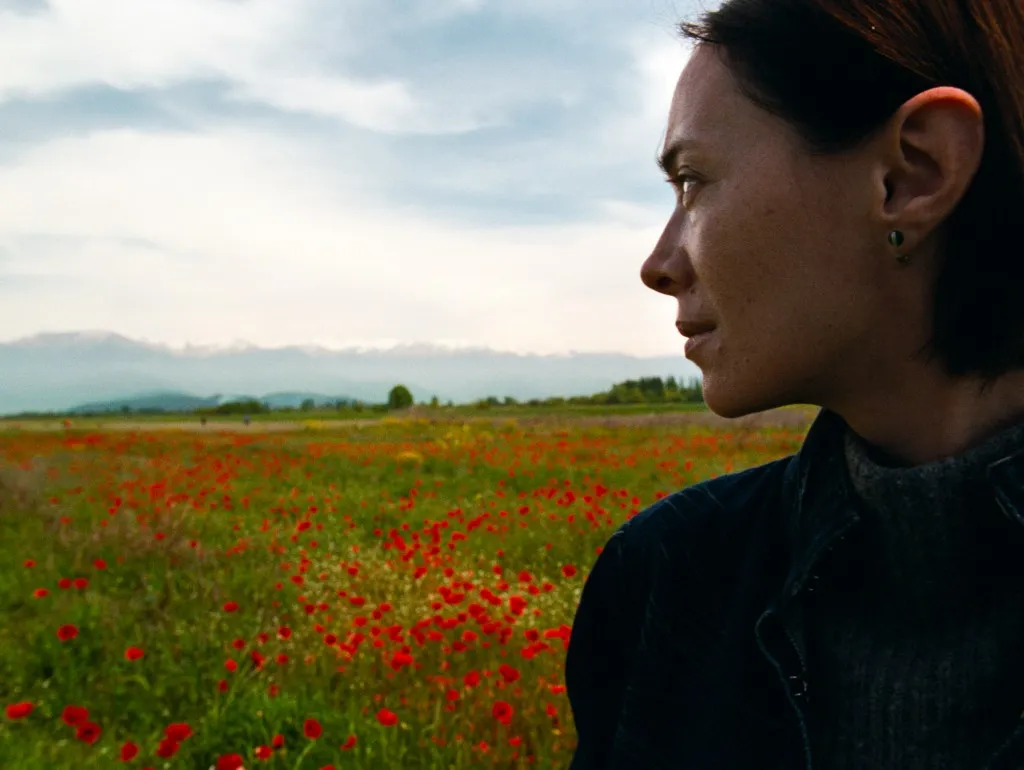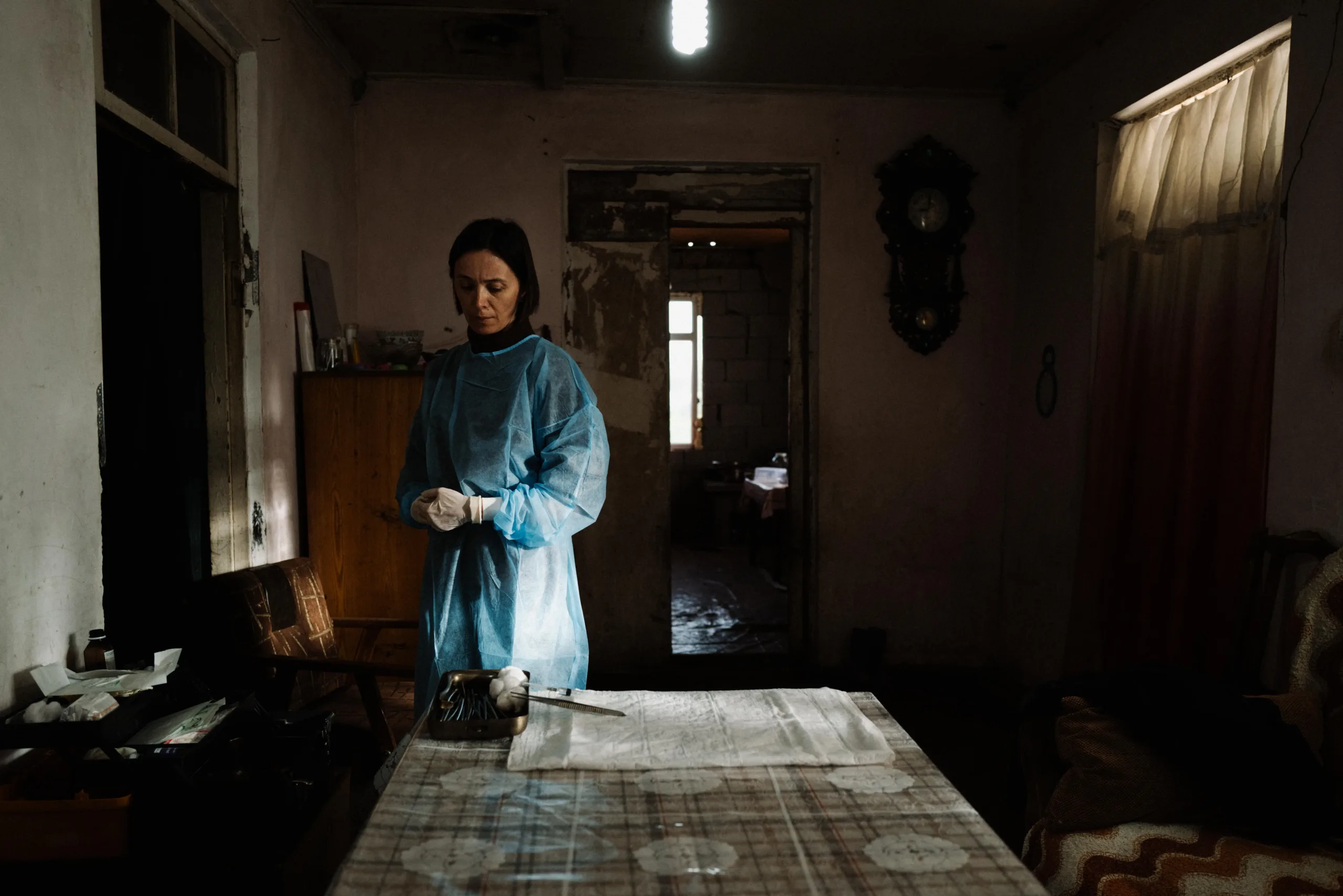Dea Kulumbegashvili is a Georgian director who tells compelling stories about women’s lives. In her acclaimed 2020 debut Beginning, she portrayed a persecuted Jehovah’s Witness, and now in April she shines a light on other urgent issues women face.
April had its world premiere this year at the prestigious Venice Film Festival, where it was met with critical acclaim. Audiences will also get to see it at film festivals in Toronto, San Sebastian, and New York this fall. Kulumbegashvili’s films don’t shy away from difficulty—April delves deep into traditions that curtail women’s freedoms in rural Georgia.
The film follows an obstetrician named Nina who provides secret abortions, despite the controversy and risks involved. With political and religious opposition strong in the country, legal abortion is accessible mainly in name only for many Georgian women. Kulumbegashvili handles this sensitive topic with care, inviting conversations about empowering choices that affect women’s lives and futures.
Abortion continues to be an important social issue worldwide as laws change. Movies that explore related human experiences, like April, feel especially thought-provoking. Kulumbegashvili crafts compelling characters and stories, leaving audiences much to reflect on long after the end credits roll. For those intrigued by independent film with something meaningful to say, April may become one of the year’s most buzzed-about discoveries.
Facing Judgment in a Patriarchal Land
Nina is a highly skilled doctor working in a rural hospital obstetrics ward in eastern Georgia. As an OBGYN, she helps deliver babies and cares for expecting mothers. However, Nina also quietly takes on another critical role.
In the deeply religious and traditional villages surrounding her town, Nina knows that abortion is viewed as shameful. Yet unwanted pregnancies occur. Due to the distances involved, traveling elsewhere for termination isn’t feasible either. So Nina discretely provides that service for desperate women in need.
One delivery goes tragically wrong, though, when a stillborn infant emerges from a mother with untreated complications. The grieving father refuses to accept it wasn’t preventable. Worse, he reveals Nina’s secret abortions to the hospital administrators. Now she faces an investigation that threatens her career.
Nina’s independence and strength of character are evident. Years working in a system stacked against women’s autonomy have made her a tough yet empathetic protector of their choices. Her former relationship with colleague David shows past struggles too.
We also meet some of the people whose lives Nina helps change. Young Nana, a deaf teen from an abusive home, turns to her during a personal crisis. Meanwhile, Mzia secures Nina’s aid for her daughter, despite knowing the truth of their dark situation.
Though facing censure, Nina stands by the communities she serves. Her patients trust her when the world says they shouldn’t. But with forces closing in, how long can one woman continue fighting for others’ freedom in a place unwilling to grant its own?
Images of Defiance
Dea Kulumbegashvili wields the visual prowess of a musician. In April, she conducts a cinematic symphony through long takes, purposeful framing, and raw symbolism.
Nina’s world unfolds with fluid precision, thanks to Khachaturan’s restless camera. He lingers on the mundane while teasing out subtexts. Births are observed starkly yet tenderly, honoring realities faced. Calm clinic rounds become thrilling voyeurism into private pains.
Divergent styles merge to greater effect. Real birthing blends with spectral apparitions haunting the peripheries. Is this creature Nina’s fear manifest, or a cultural criticism? Like Nina balancing duties, elements complete each other more than contradict.
Compositions cram conversations to the margins yet amplify their electricity. In isolation yet togetherness, characters’ fates intertwine urgently. Kulumbegashvili collapses distance to draw us into shared responsibility.
Ginzel and Herbert ensconce us in elemental dread. Weather ravages not as a spectacle but mirrors internal tempests brewing. Bodies function as brutally as the patriarchy demands they be viewed. Score and ambience fuse clinical precision with suffocated yearning.
Sukhitashvili owns her canvas with restrained fury. Cool command and tattered vulnerability interlace, a high-wire act never acknowledging its difficulty. Beneath composure broils conviction, compelling people to feel what they’d deny her.
Through virtuosic form, daring to disrupt expectations, Kulumbegashvili ensures no spectator can watch April solely as dispassionate reportage. We are challenged to recognize our shared stake in others’ agency over their lives and bodies.
A Subversive Exploration of Independence
April delves deeply into the stifling patriarchy Nina navigates. Through muted rebellion and care for others, she fights for autonomy in a world denying women control.
By design, Nina withstands routine sexism and unsafe expectations. Her solitary nature stems from resisting obligations to men, instead finding purpose through medicine. Kulumbegashvili presents her solitary defiance as an act of survival against domination.
The creature’s appearances take on new significance when viewed as Nina’s internalized struggles personified. On the fringes like this phantasmal form, she sees herself—separate from relationships denying her independence. Yet surroundings depicting vicious norms and radiant vistas in the same frame add nuance, just as Nina’s character refuses simplification.
The film shuns spelled-out conclusions, much as Nina rejects complete submission. Ambiguities open discussions on women’s agency rather than judge. If nature mirrors cultural brutality at times, quiet beauties also emerge, leaving interpretive space. Contradictions may mirror the complexity of Nina’s reality and resistance, with no clear victories in her lonely plight.
Kulumbegashvili ensures multi-faceted discussion on rules limiting choices over life and body. By honoring ambiguities, she tells a nuanced story of one woman’s enduring fight for self-ownership against oppression’s many insidious forms.
April’s Unflinching Gaze
Dea Kulumbegashvili’s April presents a bold, unflinching vision that demands much of audiences. With its displays of raw medical procedures and surreal imagery, the film is sure to divide on first viewing.
Kulumbegashvili approaches her craft with utter fearlessness and faith in her abilities. She wields cinematic language to confront difficult realities and internal turmoil, never compromising her intricate style for ease of digestion. This confident auteur trusts viewers to rise with her ambitious work.
Elements like the unexplained creature and graphic birthing scenes are challenging pills to swallow. Yet the director knows such jarring notions reflect real-world cruelties women weather. Her unfettered exploration holds a mirror to societal ills, however discomforting the reflection.
While not a comfortable ride, April’s searing empathy for those lacking autonomy ensures it stays with anyone open to comprehending autre perspectives. Its affecting protagonist and piercing social commentary cement the film as one demanding reflection long after credits roll.
Kulumbegashvili’s uncompromising vision and masterful execution mark her as a filmmaker of immense promise. April should raise her profile amongst cinephiles while turning more heads in her native Georgia. Regardless of viewers’ stances, her fearless artistry merits career-defining acclaim and a devoted following for boundary-pushing works still to come.
A Vision Unlike Any Other
April forges its own path, unlike typical “issue” films. Dea Kulumbegashvili draws on cinematic influences while crafting a singular, ambiguous work.
She pays homage to masters like the Dardennes brothers through lengthy takes and documentary-like realism. Yet where they pass clear moral judgments, Kulumbegashvili leaves room for individual interpretation. Likewise informed by Cristian Mungiu’s gritty dramas, she depicts gynecological procedures with equal frankness but a more open-ended portrayal of her characters’ inner lives.
Where films like Vera Drake and Happening center righteous heroines battling the system, Nina exists in solitude within and against society’s confines. Her motivations remain elusively personal rather than political. Even Jonathan Glazer’s abstract Under the Skin finds a clearer statement than April’s nuanced symbolism.
The director spotlights women’s agency through one woman’s indefinable fight rather than polemicizing. Autonomy means something distinct to Nina than pregnancy rights activists, reflecting reality’s complexity. Intertwining story with phantasmal sequences, Kulumbegashvili sees beyond realism into the psyche’s layers beneath surface behaviors.
Marching to her own path, she presents a feminist work too thoughtful and ambiguous to be neater categorized. Audiences emerge questioning rather than instructed in this singular, unforgettable film.
An Unflinching Vision that Demands Its Due
April proves itself a bold piece of cinema that offers both challenges and rewards for open-minded viewers. Through her mastery of techniques old and new, Dea Kulumbegashvili crafts a rumination on womanhood that rings brutally true.
Not a film for those seeking easy answers; it will divide some struggling with its uncompromising form. But for those willing to immerse in its complex exploration of autonomy, independence, and the visceral realities of choices denied, April’s impact will linger long after.
Kulumbegashvili’s fearless direction serves a brave protagonist and stirring soundtrack, careening from realism into stranger territories to amplify Nina’s isolation. It marks the director as a virtuoso, giving free rein to boundless visions sure to grow even more astounding.
Open-hearted cinema like this deserves its devoted following. While her unflinching stares may trouble some, April and its maker demand recognition for pulling back society’s curtain with such empathy. Audiences curious about boundaries being pushed should seek this singular work and the illuminating artist behind it.
The Review
April
In sumptuously crafted scenes turning intimate struggles into resonant portraiture, Dea Kulumbegashvili tells a story that challenges as it compels. While her method risks polarization, the empathy and mysteries of April ensure its unflinching gaze merits must-see status for open-minded cinema lovers.
PROS
- Compelling central performance from Ia Sukhitashvili
- Evocative cinematography that immerses viewers
- Addresses timely themes of women's autonomy in a repressed society
- Director's confident visual style and willingness to confront difficult realities
CONS
- Ambiguous elements like the creature may divide or confuse some audiences.
- Ponderous pacing may test the patience of those wanting a tighter narrative.
- Uncompromising aesthetics won't appeal to all viewers.



















































